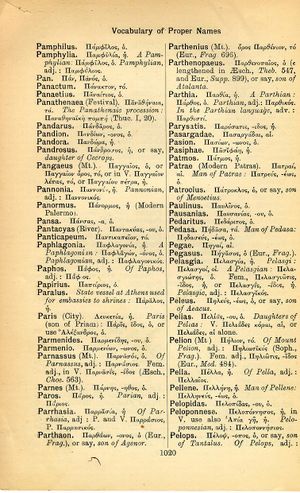Papirius
ὁ γὰρ ἀποθανὼν δεδικαίωται ἀπὸ τῆς ἁμαρτίας → anyone who has died has been set free from sin, the person who has died has been freed from sin, someone who has died has been freed from sin (Romans 6:7)
English > Greek (Woodhouse)
Παπείριος, ὁ.
Latin > English (Lewis & Short)
Păpīrĭus: i (old form Păpīsĭus, Cic. Fam. 9, 21, 2; Paul. ex Fest. p. 23; Fest. p. 242 Müll.), m.,
I the name of a patrician and plebeian gens, Cic. Fam. 9, 21, 2.—Thus,
1 The dictator, L. Papirius Cursor, Liv. 8, 30; Cic. 1. 1.—
2 C. Papirius Carbo, the friend of Ti. Gracchus, Cic. Leg. 3, 16, 35; id. Brut. 27, 43; 62, 221; id. Tusc. 1, 3, 5; Tac. Or. 34. —Hence,
A Păpīrĭus, a, um, adj., of or belonging to a Papirius, Papirian: Papiria lex, Plin. 33, 3, 13, § 46: tribus, one of the rural tribes, Liv. 8, 37; Val. Max. 9, 10, 1; Fest. p. 232 Müll.; Inscr. Grut. 766, 2 et saep.—
B Păpīrĭānus, a, um, adj., Papirian: domus, Cic. Fam. 7, 20, 1: saevitia, Liv. 10, 3; cf. id. 8, 30: jus civile Papirianum, a juridical compilation of S. Papirius, Dig. 1, 2, 2.

